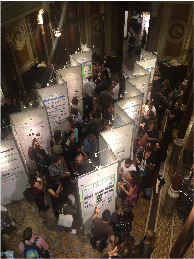The CPR co-organized ENABLE symposium was a success!
On 15th-17th November, the first EuropeaN Academy for BiomedicaL SciencE (ENABLE) symposium took place at the Palauet Casades in central Barcelona. The symposium was organized by and for young scientists and gathered around 300 PhD students and postdocs from all over Europe for a three-day symposium including scientific talks, a career day and outreach activities.
The ENABLE symposia are organized by four European centers; Novo Nordisk Foundation Center for Protein Research (CPR), the Institute for Research in Biomedicine (IRB Barcelona), the Radboud Institute for Molecular Life Sciences (RIMLS) and the Scuola Europea di Medicina Molecolare (SEMM) together with the science communication company, Scienseed. ENABLE was made possible through a Horizon2020 grant of 500.000 Euros by the European Union to organize four symposia in the four European cities from 2017 through to 2020. CPR will host the next symposium in November 2018.
 Collaborative student organization
Collaborative student organization
From each of the four European centers, three PhD students make up the scientific organizing committee. Their task is to design, manage and execute the scientific event, which includes inviting renowned international speakers, deciding on the annual topic and drawing the programs. It involves a huge amount of effort and collaboration between the 12 international students and the organizational work alone provides these students with skills important for their future career. The hosting institute also assembles a local organizing committee – the ENABLE 2017 Barcelona symposium included 22 young PhD students and postdocs – that supported the scientific organizing committee with logistic assistance to execute the scheduled activities.
Scientific objectives: Learning, training and networking
ENABLE seeks to contribute to the training of the next generation of scientific leaders in biomedicine and to set up a sustainable network of young researchers beyond 2020. The 2017 ENABLE symposium was entitled “Breaking down complexity: Innovative models and techniques in biomedicine” and addressed a wide range of topics from synthetic biology and translational medicine to cutting-edge technologies and models used for research purposes.
The scientific program included eight presentations by international and renowned speakers that were excellent in communicating their work to the young audience. From the very first keynote speaker, the participants were eager to learn more and were not shy to ask questions during the sessions. In addition, the symposium offered “Master Classes” giving the participants a unique opportunity to discuss a scientific article with the author of that paper. Finally, the “Tapas with speakers” was a highly interactive evening where the young scientists networked with not only speakers of the symposium but also other partakers. Skill development and employment opportunities beyond academia
Skill development and employment opportunities beyond academia
The first day of the symposium focused on providing the participants with tools and information important for their further career development. This included eight workshops and courses with subjects such as science communication, job interview preparation, transferable skills, time management and intellectual property. In addition, there were 33 career sessions with 18 different professionals, some from academia but most from outside academia such as entrepreneurs, capital risk investors, representatives from pharmaceutical companies, editors of scientific journals, and science communicators, among others. The sessions included only small groups of participants giving a more intimate chat with the professionals. Finally, an “Opportunity Fair” gathered more than 25 different organizations related to the biomedical sector to showcase themselves and inform participants about job opportunities in their organization.
Public outreach activities
ENABLE also aims to involve the public in biomedical research and prepare future scientific leaders to communicate their biomedical discoveries to the general public. During the symposium, a number of “Microtalks” took place at four different pubs where 24 participants gave a short presentation of their work to the general public. The participants were well prepared in explaining their research to a broad public and had found clever ways to make analogies of their scientific findings.
About ENABLE
EuropeaN Academy for BiomedicaL SciencE (ENABLE) is a project coordinated by the Institute for Research in Biomedicine (IRB Barcelona) that was awarded 500.000 Euros within the area Science with and for Society, “Celebrating European Science”, of the European Union’s Horizon 2020 program. The following European centers participate in ENABLE: Novo Nordisk Foundation Center for Protein Research (CPR), the Institute for Research in Biomedicine (IRB Barcelona), the Radboud Institute for Molecular Life Sciences (RIMLS) in Nijmegen, the Netherlands and the Scuola Europea di Medicina Molecolare (SEMM) in Milan, Italy. The Madrid-based science communication company, Scienseed is a fifth partner of ENABLE.
WEB: ENABLE
Facebook and Twitter: @EnableNetworkEU.
